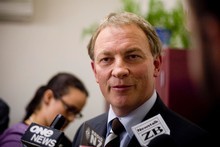The was the cup that is, just. The childlike headlines can be pasted in the kids' scrapbooks -- oops, cached on their iPads. Now we come back down to earth. We may find the earth is moving.
The last seven weeks have had an end-of-empire feel -- end of the Roman empire, that is: lavish spending by imperious officials on public spectacles and games to divert and entertain the plebs and narcotise anxiety and discontent.
And as at the end of the Roman empire, barbarians hover just beyond the horizon. They come these days in the form of northern hemisphere banks and debt rating agencies. The banks require German and other well-run European countries' taxpayers' money to rescue them from what were supposed to be safe bets on risky or feckless Greeks, Portuguese, Irish, Spaniards and Italians.
But the taxpayers are less and less fond of banks: the Occupy Wall Street movement may not have a detailed programme but it -- and the Tea Party -- reflect deeper, and international, currents of discontent and anger. Peter Dunne dropped in on the Wellington branch and bothered about "wealth and opportunity disparity", as he might have in his long-gone Labour days.
And if in the end governments and banks aren't rescued, financial pain will spread round the world and this time governments and central banks do not have the wherewithal to rescue economies on the post-2008 scale. That goes for China as well as for the old rich countries whose brilliant financiers got us into this.
If the 2008 crash finally really crashes, it will cut the capacity of the old middle classes in the old rich countries and the new middle classes in the rising countries to buy our food and to buy products made from Australia's exports.
If that happens and it then takes a while to come right, the next parliamentary term here could be downbeat or even bleak.
Now note that the world's population gets to 7 billion next Monday, give or take a few days.
That is twice the 1960s population and people are using resources about 20 per cent faster than the sun and earth produces or replenishes them. (Some say faster.) This cannot go on indefinitely: outbreaks of water and food shortages round the world tell us that. That is food for conflict.
So far there is little sign of strategic Beehive or official thinking about what this means for us. No party wants to seriously debate population.
Population puts the spotlight on India, set to be the most populous country on current trends and a growing economic power. Tim Groser is seeking a free trade agreement. A "NZ Inc" strategy for India issued last Thursday after months on the desk of the dynamic Murray McCully, reshaper of our global destiny, aims to align the actions of departmental and agency officials and the private sector in the hope we do more business there.
Six other NZ Inc country and regional strategies, some completed months ago, are to be issued next year.
Trade is the NZ Inc preoccupation. McCully's speech to a foreign issues conference on Thursday focused tightly on trade. The India strategy gives one paragraph to "people-to-people exchanges" plus some tips on differences. Just as with China, there is no plan to build an educated public knowledge of the history, heritage, culture or languages of these two emerging giants.
The strategy is tactical rather than strategic.
But neither, so far, has the government been strategic about the looming 2020s fiscal crunch in pensions and health services. John Key sticks to his 2008 commitment to a pension qualifying age of 65 and Tony Ryall's vigorous (and effective) focus has been on more efficient delivery of selected services.
This is the backdrop for the election campaign which can get serious now the cup's run is over: short-term uncertainties that could turn nasty and, in the background, longer-term global structural change.
The Labour party hopes to link the external financial turmoil and its effects here such as the country debt downgrade to cabinet action or inaction. It will use today's pre-election fiscal and economic update and forecasts, which is likely to display more red than the budget did back in May, to say the tax cuts were irresponsible and fiscal management skewed.
The National party's interest is in getting through the next five weeks looking calm and in-charge. It's poster set is accordingly more-of-the-same.
The risk for National is that voters buy its soothing line but that things go bad after the election and there is a whiplash. This is obviously not a 2011 election risk but it is a 2014 risk.
Of course, there is another scenario: that there is not a new and worse global financial crisis and slowdown because Europe fixes its immediate mess and China stays on its growth trajectory, that gradually over the next 10 years rich countries fix their badly red-inked balance sheets and that smart organisation and new technology solve the global resources challenges -- and that here we stay on cruise.
Place your bets.

